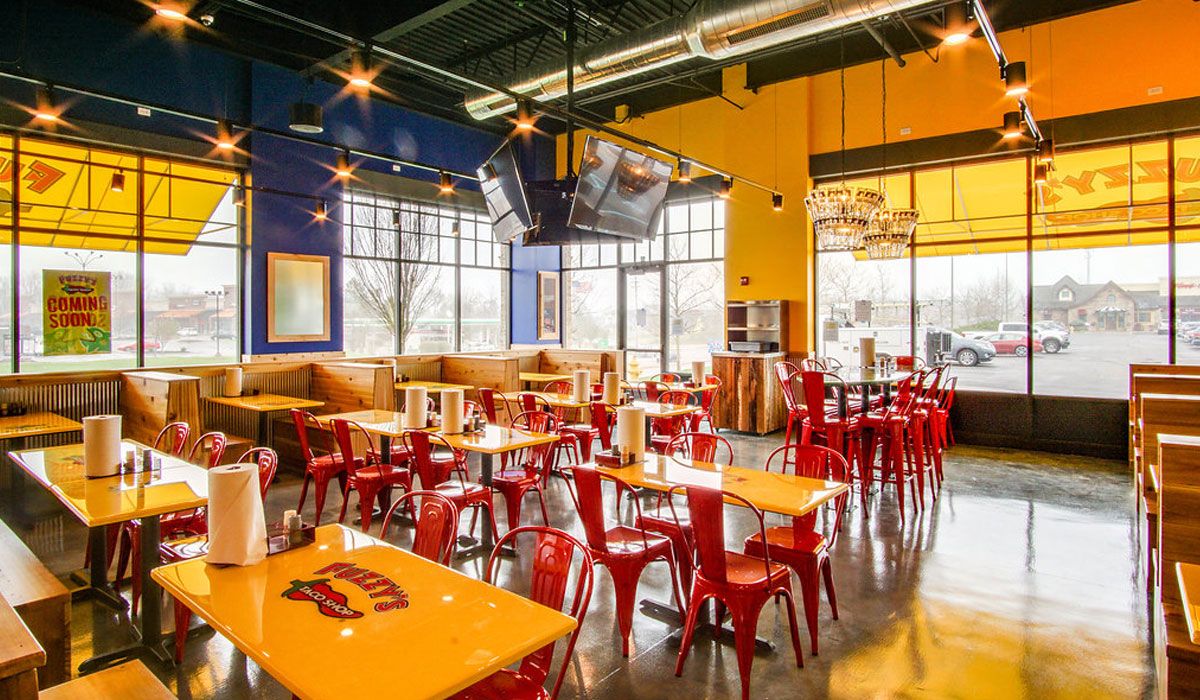One Fuzzy’s Taco Shop franchisee in the Dallas-Fort Worth area spent years in Southern California, and, to customers who walk into his store, his love for the Baja lifestyle is obvious. He commissioned a local artist to create a huge wall mural of a marlin, decorated other walls with fishing scenes and tournament posters, and even installed corrugated tin wainscotting in the shape of waves.
“You can definitely tell it’s a Fuzzy’s Taco Shop when you enter, but he’s also made it ‘his’ Fuzzy’s,” says Laura Purser, vice president of marketing for Fuzzy’s Taco Shop.
Individuality isn’t usually associated with the franchising model, one built on brand consistency down to the most minute details. But some limited-service brands have found that allowing franchisees the freedom to imbue their stores with their personalities brings about benefits like increased community connection and a deeper degree of trust.
At Fuzzy’s, franchisees aren’t given total freedom in regards to decor. All stores for the Fort Worth–based concept have a fun, funky beach vibe with bright colors and marlins mounted on a wall, in keeping with the Baja-style Mexican fare and frozen margaritas that are trademarks of the brand. But that marlin on the wall looks different from store to store—it might be painted in the colors of the owner’s favorite sports team, for example. Fuzzy’s franchisees also pick music they like from an approved provider and frequently decorate with local sports jerseys and other swag. Sometimes, they even invite local bands to perform on the weekends.
“From the start, it’s been important to us that our franchisees make their restaurants their restaurants,” Purser says. “The franchisees know their communities best and should be able to incorporate items in their restaurants to reflect what’s important to them and their guests.” This approach helps Fuzzy’s truly become part of its communities, she says. Team members are drawn to employment with Fuzzy’s because the brand has been in their communities for years.
East Lansing, Michigan–based coffee concept Biggby Coffee’s franchisees differentiate themselves by using their individual passions to connect locally through service. They sponsor local teams and charity drives; some franchisees regularly drop coffee off at hospitals or fire stations, and others attend school plays and games. One franchisee hosts markets every month where local women can sell their products, and also focuses on hiring people who might struggle to find work, such as teens with disabilities. Another hosts craft nights for kids, bringing supplies into her stores.
This past spring, Biggby held a brand-wide promotion to save the bees in collaboration with the National Honey Board; a particularly relevant campaign due to the fact that some franchisees actually keep bees and have incorporated that activity into their Biggby stores. “I am fortunate to not only educate many people about bees, which I love doing, but I also get the health benefits of backyard honey, and the fun of being known as the ‘Bee Man,’” franchisee Mark Dykema says.
Biggby Coffee doesn’t just encourage franchisees to bring their personalities into the stores; it also celebrates these personalities. The website features profiles of unique franchisees. “At the end of the day, the franchisees are the lifeblood of our business,” Biggby vice president Jamie Stepanian-Bennett says. “We have very tried and true practices and methodologies, but we have to understand that they are independent business people.”
The publicity Biggby gives its franchisees’ individuality, as well as their value statement of, “We exist to love people,” means that it typically attracts franchisees interested in having some degree of creative freedom.
Jersey Mike’s, a New Jersey–based sub shop, also spotlights its franchisees’ interests through charitable work. The nationwide chain is well-known for its philanthropic efforts, which include an annual Month of Giving (during 2019’s month it raised more than $7 million for various market-chosen charities) as well as smaller, local promotions throughout the year. “When we go into a community, we try to see where the franchisee’s heart leads them,” Jersey Mike’s president Hoyt Jones says.
New franchisees donate subs to a charity of their choosing when the store opens, but it doesn’t end with opening day; franchisees might sponsor a sports team, donate to a hospital or school, or help children with health problems. Usually there is some personal connection, Jones says. As their years with Jersey Mike’s grow, franchisees develop wider community networks, which often results in working with dozens of local charities over a few decades. Jersey Mike’s does little to no vetting of franchisees’ chosen community partners. “You have to have the confidence that they’re going to make the right decisions. That’s why you selected them to be a franchisee in your system,” Jones says.
That confidence from the franchisor translates into greater satisfaction on the part of the franchisee, which, Purser says, means it’s less likely that they’ll abuse their freedom. “Many Fuzzy’s franchisees have been part of other organizations with stricter guidelines, so I think they appreciate this sense of freedom and respect the process when it comes to running ideas past us,” she says.
Jones says it also sets a good example for younger employees. They not only see and participate in their employer’s efforts to give back, but they also understand that, through their store, their personal lives can directly correlate to doing good work and being part of a community. It’s basic human psychology. “If we’re constantly telling them what to do, they’re less happy,” Jones says. “They get more excited about it because it’s their choice.”









